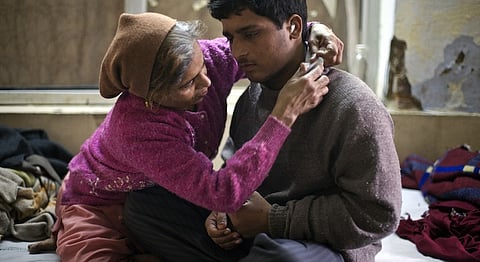
- #HGCREATORS
- #HGEXPLORE
- #HGVOICES
- #HGSHOP
- CAREERS
- ABOUT US
- CONTACT US

[Stuart Freedman is a photographer and writer based between London and New Delhi. A member of Panos Pictures, he has, over the last two decades, covered stories from Albania to Zambia. His work has appeared in, amongst others, Life, Geo, Time, The Sunday Times magazine, Der Spiegel, Condé Nast Traveller and Smithsonian.
He has been exhibited widely and his work has received recognition from Amnesty International, POYi, World Sports Photo, The AOP, The RPS, UNICEF and the World Press Masterclass.
This photo-series titled ‘Shadow People’ highlights the plight of Delhi’s mentally ill and homeless. The words that follow are the photographer’s own.]
The poor have fallen out of the narrative of modern India. Delhi, the nation’s capital, has been transformed into a vibrant, wealthy metropolis. But where extremes of wealth tread, illness and despair follow, and Delhi is today in the grip of a mental health crisis.
An estimated 20 million Indians suffer from mental disorders, many of them hidden from public view by their families. Delhi is a city of migrants and every day thousands more arrive to try to escape the poverty of the village.
Many will remain homeless, divorced from the traditional family structure and culture. Delhi’s army of homeless is conservatively estimated to number around 100,000 people. Mental illness in this group is treated either by violence from the rest of the community or traditional ‘quack’ or faith healers.
Delhi has had a traumatic history. The city was destroyed by the British in 1857, by Partition nearly a century later and riven by anti-Sikh violence in 1984 after Indira Gandhi’s murder.
It seems to me that Delhi has lost a great deal of its culture and sense of itself, a dangerous thing to lose. A psychiatrist might contend that by its rampant consumerism it is trying to ‘feed itself’ an identity.
Nimesh Desai, head of psychiatry at the New Delhi-based Institute of Human Behaviour and Allied Sciences, estimates that India has fewer than 4,000 psychiatrists, and even fewer general mental health professionals.
‘The lack of psychiatrists is bad and the shortage of psychologists, social workers and counsellors is even more alarming,’ Desai told me. ‘It meets about five to seven percent of the projected need.’
Desai has however attempted a solution. After eight years of intense lobbying, his team have started to conduct weekly open air surgeries for the mentally ill homeless in Old Delhi.
He is accompanied by a High Court judge who assesses each patient to decide whether or not Desai can inject them with anti-psychotic drugs. On rare occasions he sections them to his mental hospital in the east of the city.
I. Men with mental health problems talk to a volunteer psychiatrist from the Institute for Behavioural Health Studies and Applied Sciences (IBHAS) in Urdu Park near the Jama Masjid, Delhi, India..It is estimated that around than 150,000 people—more than one percent of the city—is homeless, and, with constant migration this is increasing on a daily basis. The incidence of mental illness amongst this group is very high. Delhi has little formal provision to deal with such a situation.

II. A homeless woman attacks a homeless man during an argument in an area full of the destitute and poor near the Jama Masjid. Delhi, India.

III. A psychiatrist interviews a man at the Institute of Human Behaviour and Allied Sciences, Delhi, India. The department of Psychiatry is led by Dr Nimesh Desai, who leads a revolutionary street clinic for the mentally ill homeless. He is licensed to administer anti-psychotic drugs on the street, but those patients that require hospitalisation come to this clinic.

IV. A patient kisses his wife who visits him in the secure ward at the Institute of Human Behaviour and Allied Sciences, Delhi, India.

V. A Sufi holy man or Pir, exorcises a spirit from a woman at a dargah or shrine in South Delhi..Delhi is typical of many Indian cities in that it has very few trained psychiatrists and many people still consult holy men for traditional solutions to their psychiatric needs. As India progresses materially and embraces the market, and as traditional familiar and social ties are increasingly broken, incidences of mental health issues appear to be rising.

VI. A homeless mentally ill man picks up a rock to throw at passing traffic. Delhi, India.

VII. A psychiatrist and a social worker lead a group therapy session in Urdu Park for the homeless and addicted poor. The work is part of an outreach program from the Institute of Human Behaviour and Allied Sciences in Delhi. The effort is part of a unique street clinic project, that aims to treat the mentally unstable homeless on the street.

VIII. Homeless addicts prepare and inject heroin under a flyover, New Delhi, India.

IX. At the Phool Mandi shelter, Khushi Ram, a worker for Aashray Adhikar Abhiyan counsels a former drug addict from Nepal who has been treated for schizophrenia.

[All data and statistics were taken at the time these photos were published in 2010. Present day numbers will vary].
Follow Stuart Freedman on Twitter @stuartfreedman and see more from his body of work on his website.
If you liked this article we suggest you read:
